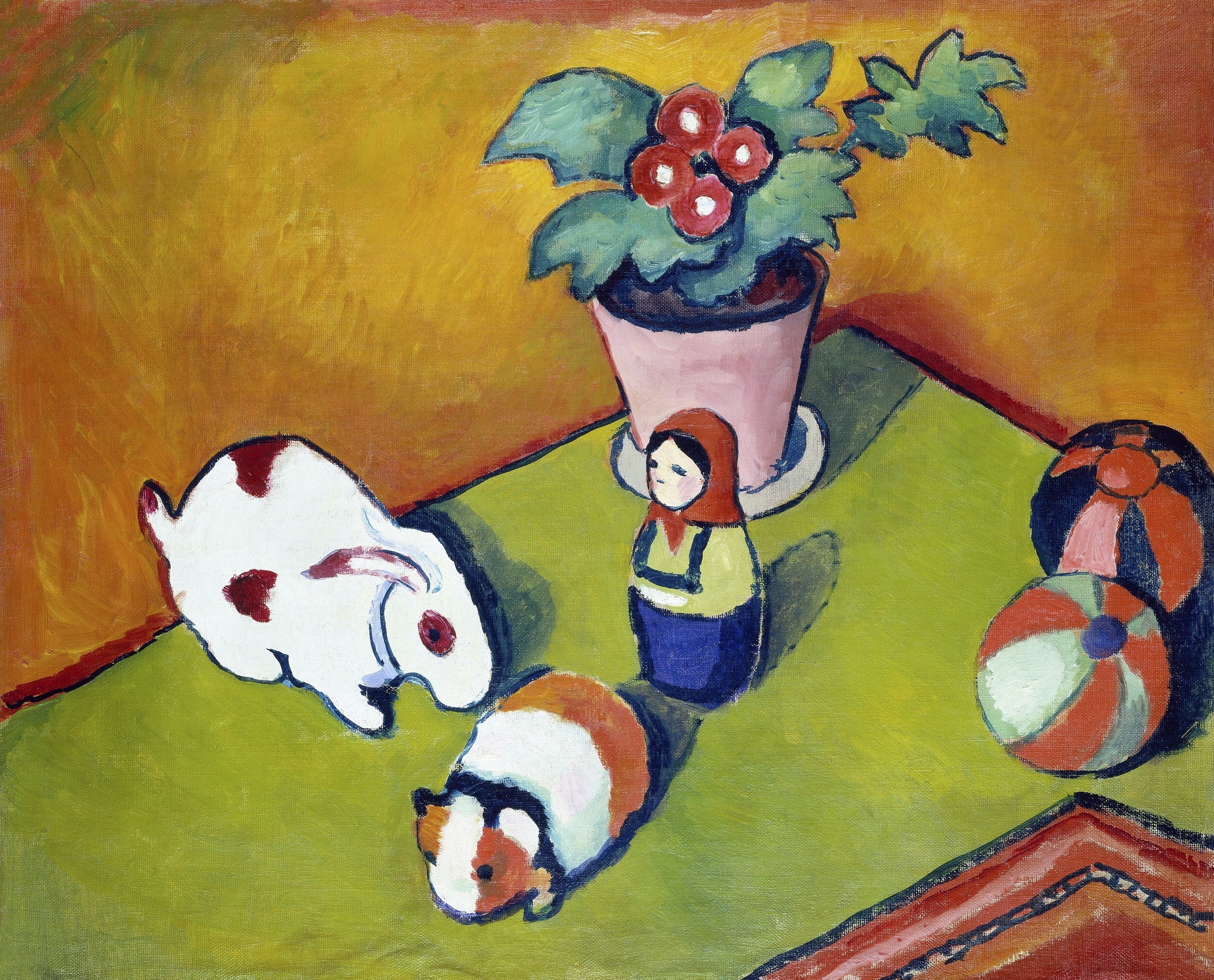Mother’s Day, Not Always A Happy Holiday
August Macke, Little Walter's Toys (1912)
Honoring mothers and motherhood can be found in cultures around the world. Greeks celebrated Rhea, who was mother to the gods and mother of fertility and motherhood. A Christian tradition, known as “Mothering Sunday,” was a celebration of the Virgin Mary and mothers in Great Britain and parts of Europe during Lent. In Judaism, mothers are celebrated on 11th day of the Hebrew month of Cheshvan (in October/November) and honors the death of Rachel, Jacob’s wife. The Buddhist tradition, “Mua Vu Lan,” is an annual celebration of mothers held in Vietnam.
In the United States, the origin of Mother’s Day dates to the 19th century. In the early 1900s, Anna Jarvis embarked upon a public campaign to establish an official holiday for mothers after the death of her mother. Herself childless, Anna lobbied for the special day as a way to recognize women’s contributions to society. In 1914, President Woodrow Wilson declared the holiday to be held on the second Sunday of May.
By the 1920s, the holiday had been so commercialized, that Anna denounced the holiday, petitioning the federal government to remove the holiday from the official calendar. And so, after thousands of years of honoring mothers and motherhood, the post-modern commercialization of Mother’s Day has been foisted on the public via television, social media, radio, advertisements, sales promotions … the list is endless. For some, the month-long lead-up to the holiday followed by endless social media posts capturing just the right smiles and hugs on the special day, can be unsettling.
The Value of Woman & Existential Meaning-Making
Becoming a mother is a life-changing event, encompassing biological, psychological, social, and spiritual transformations. It is an existential transition, where meaning-making can lead to new understandings and revelations about the one’s choices, freedoms, responsibilities, fragility, and mortality. Given the existential nature of mothering, there can be merit in the common phrase, “Being a mother is the most important thing I have ever done in my life.” It represents the enormity of the task at hand.
But what if you are a woman unable to have a child? Or a woman who has experienced pregnancy loss? Or a mother who has experienced the death of a child? Or a woman who chose not to have a child?
French existentialist Simone de Beauvoir wrote:
I'm not against mothers. I am against the ideology which expects every woman to have children, and I'm against the circumstances under which mothers have to have their children.
In a society that champions being a mother above all else, some may feel less than. On the second Sunday of May, their existential reality is that there is no national holiday honoring their life journey or life choices.
That does not mean, however, that their lives are superfluous. Indeed, woman who chose to be childless have described their lives as “superlative.” It is important to recognize that childless women make meaning in their lives and contribute to our communities in boundless ways: Work and career, volunteering and donating are meaningful and purposeful acts that contribute to society, create networks, improve lives, and the planet. Others may find purpose and meaning in the selfless act of raising a pet: Fur-babies require commitment, selflessness, kindness, nurturing, and love.
For those who are childless not by choice but by circumstance, today may be emotionally challenging. These self-care tips can help get you through the 24-36 hours of mother’s day flashpoints:
Avoid social media (yes, even tomorrow because there will always be late postings).
Develop a personal ritual that you engage in each Mother’s Day, e.g., cook a special meal, light a candle, meditate, go for a hike in nature.
Write a letter to yourself to be read the following year on the second Sunday of May. Keep the letters in a safe, personal spot and return to them whenever you feel overwhelmed by societal pressures about the importance of being a mother.
Create a set of greeting cards to send to all the women you know who are not mothers and mail them the third Sunday in May.
Bake a batch of dog or cat treats for your fur babies.
Start a gratitude journal.
Develop a playlist of music that makes your heart sing and listen to it each second Sunday of May.
Losing one’s mother
There are many ways to lose one’s mother: Neglect and abuse, unfinished business, and/or grief and mourning. Any or all of these may overshadow Mother’s Day.
Neglect & Abuse
Mothering is not an easy task, even for those who declare it easy. Decades of research have shown that to be a healthy functioning adult we do not need a perfect mother or a near perfect mother. In fact, what we really need is a “good enough mother.”
British pediatrician and psychoanalyst D.W. Winnicott coined the term to describe the mothering bond first established with the infant — where the infant’s needs are consistently met in sacrificing the needs of the self (think sleep or breastfeeding). Over time, the good enough mother begins to wean the infant from non-stop attention; she remains loving and empathic but also does not rush to soothe the baby as quickly as she did in early infancy. Out of frustration, the child may fuss or cry; when the mother returns, the child’s frustration is leveled off and needs are once again met. This type of engagement provides a solid basis for the child’s engagement with the external world — outside of self and mom—and helps the child realize that life can be challenging. As adults, our ability to engage with others, form healthy attachments, and self-soothe when obstacles or disappointments occur is connected to having a “good enough” caregiver.
If, however, we suffered as children from physical, emotional, or sexual abuse or neglect, national holidays celebrating our parental abuser(s) can be painful. Some adult children cut off from a parent, while others suffer in silence and maintain the family façade. Longing to have the mother one never had, while privately agonizing over the one that raised you can draw one into a double-bind. A holiday that celebrates the wondrous bond between mother and child can produce negative triggers, flashbacks, and grief responses.
In my practice, I often draw from the wise words of Buddhist monk Thich Nhat Hanh to help clients find comfort on their journey toward compassion and forgiveness:
Compassion is a kind of protection – the most effective that you have. Without compassion, you allow fear and anger to express themselves, and that will draw attention to you and make them afraid of you; then they will attack you, because they are also afraid.
That is why, with compassion, understanding is possible. When you look at aggressive people, you see that they suffer. They have violence in them, they have anger in them. They don’t have much joy and compassion; that is why they suffer.
Unfinished Business
Gestalt psychotherapist Fritz Perls identified unfinished business as the “inability to find closure.” The most permanent form of unfinished business occurs when a person dies before closure is met. Closure can be found through forgiveness, understanding, confessions, and acceptance. When working with families during the end of one’s life, it can be highly beneficial to identify any lingering issues that have yet to be addressed. A grief counselor can be useful in guiding the discussion, when the topic is painful or difficult to bring up.
For those who have unfinished business with their mother, Mother’s Day can be a beacon flashing in the dark, reminding them that they will never know why … will never be able to say … will never understand …. or will never be able to ask.
I engage clients in unfinished business and grief work using the Gestalt techniques of Empty Chair, one that Perls used with individual clients and in psychotherapy group settings. Here is a brief session during which a granddaughter engages in Empty Chair work with her deceased grandmother.
This work can be done with a subject who is alive or deceased. Benefits of Empty Chair work include:
Concluding unfinished business and finding closure on a difficult issue.
Reducing negative self-talk.
Developing insight and acceptance to own’s feelings.
Two Women on the Shore, Edvard Munch, 1898
Grief & Mourning
The first 12 months after the death of a loved one can be one of memories, longing, fondness, continuing bonds, and identifying objects that help one continue to feel close. It is also a year full of national, social, cultural, religious, and spiritual holidays; anniversaries; and birthdays.
Mother’s Day after the loss of a mother or grandmother can be difficult, especially if it is the first one after the loss. The national holiday can conjure up a treasure chest of emotions and feelings that don’t necessarily resurface on a regular day on the calendar.
These self-care tips can help get you through the 24-36 hours of Mother’s Day flashpoints:
Develop a ritual that you engage in each Mother’s Day to recognize your relationship with this person.
Write a letter to your mom or grandmother sharing what you are feeling today. Light a candle a read it aloud.
Engage in an activity that you and your loved one did together.
Write the letters of your loved one’s first and last name in two vertical rows. Using the letters as the first word for each, write a word that describes her.
Spend time with family and share stories about her.
Today, millions of people are celebrating Mother’s Day in the United States and in China. Just like grief, each person has their own relationship with the holiday. Whether you celebrate or not, if you live in the U.S. you are likely bombarded with messages about mothering and motherhood. Finding time to engage in your personal meaning-making around mothering and motherhood can help you grow from pain and loss and begin a new annual ritual that continues to support you on your journey.
Lisa A. Rainwater, PhD, MA (couns) LCMHC, NCC, CGP, CT is the owner of Rainwater Counseling in Winston-Salem, North Carolina, where she provides relational attachment, grief, and depth psychotherapy to individuals and couples. She earned a master’s in German Studies from the University of Oregon; a master’s in counseling from Wake Forest University; and a doctoral degree in German and Scandinavian Studies from the University of Wisconsin-Madison. Lisa has completed training in couples and marriage counseling and the practice and science of well-being. She is a Certified Thanatologist through the Association of Death Education and Counseling and is seeking certification in Grief Therapy as Meaning Reconstruction at the Portland Institute for Loss and Transition.


